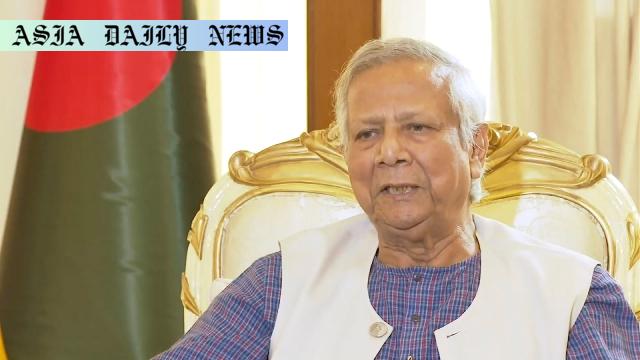Bangladesh faces challenges but Nobel laureate Muhammad Yunus outlines the plan for recovery and democracy.

Introduction: Muhammad Yunus Takes the Helm Amid Crisis
The resignation of Prime Minister Sheikh Hasina last August left Bangladesh in a fragile state, both politically and economically. As student protests erupted, demanding reform, the mantle of leadership fell upon Nobel Peace laureate Muhammad Yunus. Serving as interim chief advisor, Yunus has set forth a vision to stabilize the nation and guide it toward prosperity.
A Nation Rebuilding from Turmoil
Bangladesh faced immense challenges when Yunus assumed leadership. Citing a “devastated society, devastated economy, and devastated political system,” he acknowledged the heavy responsibility ahead. Still, Yunus emphasized progress achieved since his administration began. Restoring faith in the judicial system and addressing economic collapse have been among his immediate priorities, laying the groundwork for a comprehensive recovery.
Democratic Elections: A Vital Pillar for Progress
Democracy remains at the heart of Yunus’s vision for Bangladesh. Speaking candidly in the NHK interview, he declared the end of this year as the target for conducting free elections. “When the election is held,” Yunus stated, “the new government will have a very safe and sound basis to work with.” This step is critical in ensuring a government that truly represents the people.
The Role of Young Bangladeshis in Shaping the Future
Young people played a central role in the unrest that dismantled the previous regime, reflecting their untapped potential in driving societal transformation. Yunus sees their energy and creativity as catalysts for change. He stressed the importance of providing them with opportunities to showcase their “creative power,” building a future where innovation leads the way.
Japan’s Partnership: A Lifeline for Development
Japan’s contribution to Bangladesh’s recovery is substantial, according to Yunus. With technology transfers and investment, Japan has spurred job growth among youth, providing the tools needed for economic diversification and development. This partnership reinforces the global importance of collaboration in nation-building.
Conclusion: A Nation at the Crossroads
Under Yunus’s leadership, Bangladesh is on the road to recovery. Overcoming years of political instability and economic stagnation will require deliberate, consistent efforts, but his emphasis on democracy, youth empowerment, and international partnerships provides a hopeful outlook. The forthcoming elections will likely play a pivotal role in determining whether Bangladesh can truly stand stronger in the years to come.
Commentary
The Challenge of Leading in Crisis
Taking charge of a fragile state is no small feat. Muhammad Yunus has stepped into a leadership role not by choice, but by necessity. His undeniable legacy as a Nobel Peace laureate lends credibility to his leadership, but the challenges in rebuilding an entire nation remain daunting. One can only imagine the immense pressure on him to deliver stability in a time of chaos.
Democratic Elections: A Promise of Hope
Yunus’s emphasis on elections is both practical and symbolic. Democratically-elected representatives are crucial to ensure legitimacy and foster trust among citizens. By targeting the end of the year for elections, he is signaling a commitment to accountability and transparency. Yet, the road ahead is unclear. Will the people trust the system sufficiently to return to the polls? Yunus’s approach must address this lingering skepticism.
Youth as the Driving Force
The youth of Bangladesh hold immense potential. As expressed by Yunus, their creativity and energy could provide the momentum needed to drive the country forward. It is inspiring to see a leader recognize the importance of younger generations, not just as contributors, but as integral architects of Bangladesh’s future. Educational programs, job opportunities, and platforms for innovation will be vital in nurturing their potential.
Global Partnerships: A Key Component
Lastly, Yunus’s acknowledgment of Japan’s role in rebuilding Bangladesh underscores the importance of global partnerships. In a world increasingly divided along geopolitical lines, such collaborations exemplify the power of unity. Japan’s technology and expertise have proven transformative, showing how international allies can act as catalysts for recovery and long-term stability.
In conclusion, Yunus’s vision for Bangladesh is both ambitious and necessary. Whether it’s through democratic governance, youth involvement, or global cooperation, his leadership presents a rare opportunity for the nation to rise from its challenges and emerge stronger. Only time will reveal if these plans can materialize effectively, but the foundation laid today will be critical for tomorrow.


